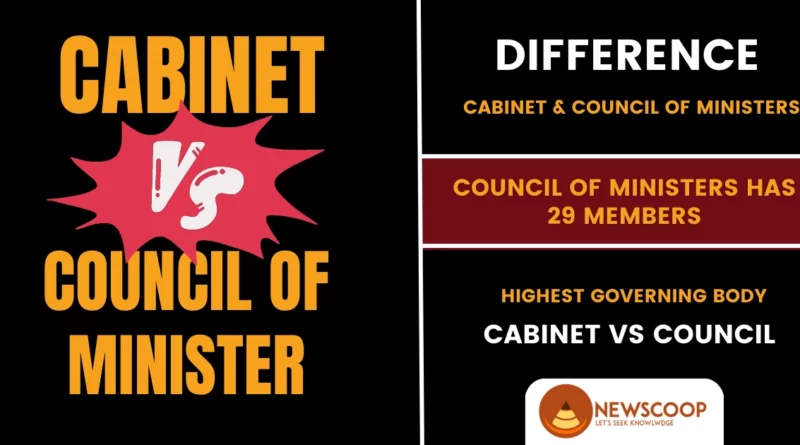Difference Between the Cabinet and Council of Ministers
In the world of politics, terms like “cabinet” and “council of ministers” are frequently used, often interchangeably. While both refer to groups of individuals involved in the governance of a country, they have distinct roles and functions.
Understanding the difference between the Cabinet and the Council of Ministers is crucial for the UPSC IAS exam. It is an important topic in the Polity subject for both the Prelims and Mains exams. By studying the roles of the cabinet, council of ministers, and ministers of state, you can gain a better understanding of the distinction between the Cabinet and the Council of Ministers for the UPSC exam.
Difference Between Cabinet and Council of Ministers
| Basis of Comparison | Cabinet | Council of Ministers |
|---|---|---|
| Definition | A body within the Council of Ministers that makes decisions on important matters, including policy-making. | A body appointed to assist the Prime Minister in making decisions on important matters. |
| Status | It is a constitutional body. | It is also a constitutional body. |
| Size | Usually consists of 15-18 ministers. | Typically includes 40-60 ministers. |
| Schedule of Meetings | Meetings are held frequently, often once a week, to discuss major policies. | Meetings are held less often or on an as-needed basis. |
| Functions | Performs collective functions such as policy-making and decision-making related to respective departments. | Advises the Prime Minister and implements decisions made by the Cabinet. |
| Authority | Has the authority to make decisions on behalf of the Council of Ministers. | Holds decision-making authority, with implementation determined by the Prime Minister. |
| Responsibilities | Each minister in the Cabinet is assigned a specific portfolio or rank. | No special designation or portfolio is given to the members of the Council of Ministers. |
What is the Council of Ministers?
The Council of Ministers is the highest governing body in the Indian government. It consists of leaders from different government ministries who advise the President of India. The council, led by the Prime Minister, is responsible for governing the country.
Important Points:
- Currently, the Council of Ministers has 29 members, including the Prime Minister, Narendra Modi.
- The Indian Parliament has jurisdiction over the Council of Ministers.
- The Council of Ministers collaborates to effectively respond to new challenges and address the unique needs of modern India.
- The President of India appoints the Council of Ministers on the advice of the Prime Minister.
- The provisions associated with the Council of Ministers are outlined in Article 74 and Article 75 of the Indian Constitution.
What is Cabinet?
A cabinet minister is a member of the executive branch of the government who has been appointed to serve in the cabinet. The cabinet consists of the prime minister’s key advisors and individuals who oversee various government departments. They are responsible for making important decisions and shaping policies.
In India, the Union Cabinet is a smaller group within the Union Council of Ministers. It consists of ministers who hold important positions and are in charge of specific areas or ministries. The Union Cabinet plays a vital role in making important decisions and shaping policies for the country.
Conclusion
In conclusion, the Cabinet and the Council of Ministers in India have distinct roles and structures. The Cabinet is the senior decision-making body, led by the Prime Minister, responsible for major policy decisions. The Council of Ministers is a larger body that includes all government ministers.
Further, the Cabinet meets frequently, while the Council of Ministers convenes less often. The Cabinet’s decisions are binding on all ministers, while the Council of Ministers assists the Prime Minister and implements Cabinet decisions. Both bodies play vital roles in governance and policy-making.
Thank You!

